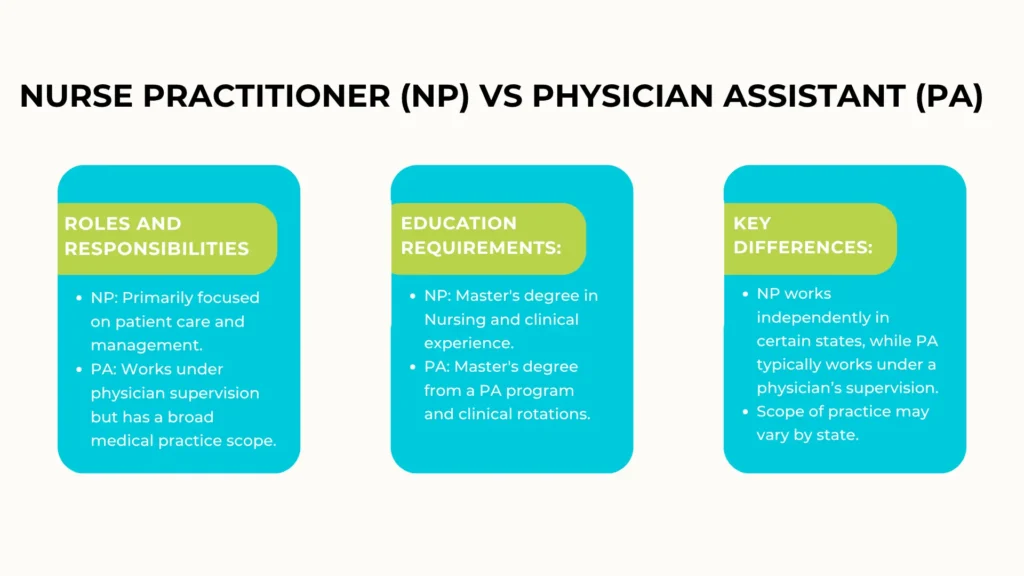When considering a healthcare career, you may find yourself debating whether to become a Nurse Practitioner vs Physician Assistant. Both roles are crucial in providing high-quality care, yet they come with different responsibilities, training, and career paths. Whether you’re just starting in healthcare or looking to transition into one of these professions, understanding the distinctions between these two roles is important.
Furthermore, understanding medical credentialing services is critical to ensuring you meet the necessary qualifications to work as either an NP or PA, paving the way for career success.
What is a Nurse Practitioner?
A Nurse Practitioner (NP) is a registered nurse (RN) with advanced education, typically holding a master’s or doctoral degree. NPs are trained to assess patients, make diagnoses, and prescribe medications. They work independently or in collaboration with doctors, depending on the state regulations.
NPs often specialize in areas such as family practice, pediatrics, or geriatrics, and they provide comprehensive care that includes health education, diagnosis, and treatment. However, NPs do have limitations in some states, particularly in prescribing certain medications and performing advanced medical procedures.
Key Roles of Nurse Practitioners:
- Diagnose and treat medical conditions
- Prescribe medications and treatments
- Order and interpret diagnostic tests
- Educate and counsel patients on health issues
What is a Physician Assistant?
A Physician Assistant (PA) is a licensed medical professional who works under the supervision of a physician. PAs are trained to perform many of the same duties as a physician, such as diagnosing conditions, interpreting tests, prescribing medications, and performing procedures. However, unlike NPs, PAs must always work under the supervision or direction of a physician, though their level of supervision can vary by state.
A major benefit of the PA role is the broad medical training they receive, which allows them to work in a variety of specialties, from emergency medicine to orthopedics.
Key Roles of Physician Assistants:
- Perform physical exams and medical histories
- Diagnose and treat illnesses and injuries
- Assist in surgeries
- Prescribe medications under supervision
Nurse Practitioner vs Physician Assistant: Key Differences
Although both Nurse Practitioners and Physician Assistants perform similar roles in healthcare settings, several key differences set them apart.

RCM for Nurse Practitioner vs Physician Assistant
Effective Revenue Cycle Management (RCM) is crucial for both Nurse Practitioners and Physician Assistants. Both professionals need to understand how to properly code and bill for their services to ensure appropriate reimbursement. RCM involves the entire process of billing, from verifying patient information to submitting claims, and even handling denials. Understanding how to navigate the complexities of RCM ensures financial health for practices and makes sure that the healthcare providers are paid for their services promptly.
By ensuring that claims are processed correctly and efficiently, NPs and PAs can maintain a sustainable practice. This also highlights the importance of accurate medical billing and coding, as these are fundamental to the RCM process.
Billing and Coding for Nurse Practitioner vs Physician Assistant
Both Nurse Practitioners and Physician Assistants must be familiar with medical billing and coding to accurately submit claims for reimbursement. The correct use of CPT codes, ICD codes, and modifiers ensures that services are billed appropriately and reduces the risk of denials. Without proper coding, your practice may face significant revenue losses and additional administrative work.
Why It is Crucial?
- Ensures proper reimbursement for the services provided.
- Prevents claim denials by ensuring codes are accurate.
- Reduces administrative work, allowing you to focus on patient care.
Both NPs and PAs must understand coding guidelines and stay up to date on regulatory changes in medical billing to ensure their claims are processed smoothly and efficiently.
Conclusion
In the debate of Nurse Practitioner vs Physician Assistant, both roles play integral parts in the healthcare system. The decision between becoming an NP or a PA largely depends on your career goals, interest in patient care versus medical procedures, and the level of independence you wish to have in your practice. Regardless of the choice, understanding medical billing and coding is essential for ensuring accurate billing, compliance, and timely reimbursements.
If you are ready to advance in your healthcare career, make sure to consider the educational requirements, job responsibilities, and financial aspects that come with each path. Armed with the right knowledge and tools, you can thrive in either role and contribute meaningfully to the healthcare industry.
FAQs
Q: What’s the main difference between a Nurse Practitioner and a Physician Assistant?
A: The key difference is that NPs often work independently in some states, while PAs work under the supervision of a physician.
Q: Can Nurse Practitioners prescribe medication?
A: Yes, NPs can prescribe medications, but their authority depends on state regulations.
Q: Which is better, a Nurse Practitioner or a Physician Assistant?
A: It depends on your career goals. NPs have more autonomy, while PAs have broader medical training and work with physicians.
Q: How does medical billing and coding affect my practice as an NP or PA?
A: Proper medical billing and coding ensure you get reimbursed correctly and promptly for the services you provide, maintaining financial health.
Q: Do NPs and PAs have the same level of education?
A: No, NPs usually come from a nursing background and pursue advanced education, while PAs have a medical model education similar to that of doctors.







